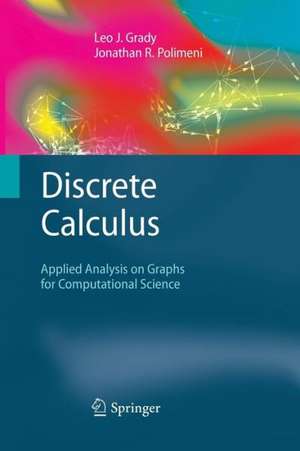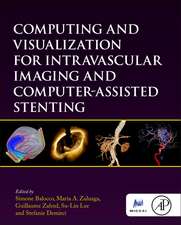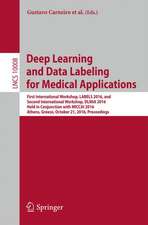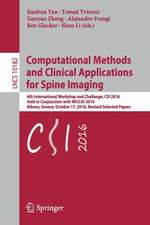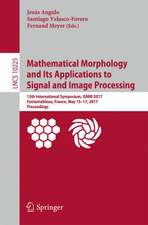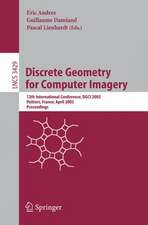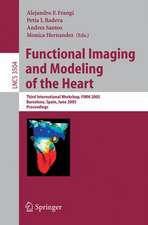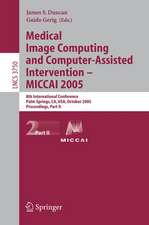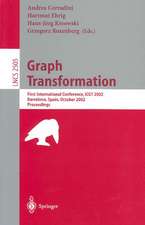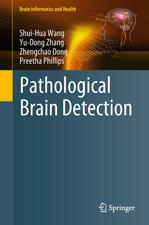Discrete Calculus: Applied Analysis on Graphs for Computational Science
Autor Leo J. Grady, Jonathan R. Polimenien Limba Engleză Paperback – 9 oct 2014
| Toate formatele și edițiile | Preț | Express |
|---|---|---|
| Paperback (1) | 1163.93 lei 6-8 săpt. | |
| SPRINGER LONDON – 9 oct 2014 | 1163.93 lei 6-8 săpt. | |
| Hardback (1) | 1172.08 lei 6-8 săpt. | |
| SPRINGER LONDON – 2 aug 2010 | 1172.08 lei 6-8 săpt. |
Preț: 1163.93 lei
Preț vechi: 1454.91 lei
-20% Nou
Puncte Express: 1746
Preț estimativ în valută:
222.72€ • 233.01$ • 185.01£
222.72€ • 233.01$ • 185.01£
Carte tipărită la comandă
Livrare economică 03-17 aprilie
Preluare comenzi: 021 569.72.76
Specificații
ISBN-13: 9781447157373
ISBN-10: 1447157370
Pagini: 384
Ilustrații: XVI, 366 p.
Dimensiuni: 155 x 235 x 20 mm
Greutate: 0.59 kg
Ediția:2010
Editura: SPRINGER LONDON
Colecția Springer
Locul publicării:London, United Kingdom
ISBN-10: 1447157370
Pagini: 384
Ilustrații: XVI, 366 p.
Dimensiuni: 155 x 235 x 20 mm
Greutate: 0.59 kg
Ediția:2010
Editura: SPRINGER LONDON
Colecția Springer
Locul publicării:London, United Kingdom
Public țintă
ResearchCuprins
Discrete Calculus: History and FuturePart I: A Brief Review of Discrete CalculusIntroduction to Discrete CalculusCircuit Theory and Other Discrete Physical ModelsPart II: Applications of Discrete CalculusBuilding a Weighted Complex from DataFiltering on GraphsClustering and SegmentationManifold Learning and RankingMeasuring NetworksRepresentation and Storage of a Graph and ComplexOptimizationThe Hodge Theorem: A Generalization of the Helmholtz Decomposition
Recenzii
From the reviews:
“The book introduces some best practices and advanced techniques in the field of discrete calculus. The articles are written by a team of experts in the field and are aimed at scientists and engineers. The book shows how the theory can be applied to solving a wide variety of real-world problems. … All the examples are well described and illustrated with source code and screen shots. I recommend this book to anyone interested in discrete calculus and its application.” (Todor Jordanov Todorov, Mathematical Reviews, Issue 2012 d)
“This book illustrates the concepts of discrete calculus with examples in circuit theory, chosen because of its natural connection to algebraic topology and maturity. … this is a unique book that brings together research in complex networks and algorithm content extraction. I have no doubt that the book will be a valuable addition to the libraries of many researchers and graduate students working in the areas of complex networks, graphics, and algorithm design.” (Alexander Tzanov, ACM Computing Reviews, July, 2011)
“The book introduces some best practices and advanced techniques in the field of discrete calculus. The articles are written by a team of experts in the field and are aimed at scientists and engineers. The book shows how the theory can be applied to solving a wide variety of real-world problems. … All the examples are well described and illustrated with source code and screen shots. I recommend this book to anyone interested in discrete calculus and its application.” (Todor Jordanov Todorov, Mathematical Reviews, Issue 2012 d)
“This book illustrates the concepts of discrete calculus with examples in circuit theory, chosen because of its natural connection to algebraic topology and maturity. … this is a unique book that brings together research in complex networks and algorithm content extraction. I have no doubt that the book will be a valuable addition to the libraries of many researchers and graduate students working in the areas of complex networks, graphics, and algorithm design.” (Alexander Tzanov, ACM Computing Reviews, July, 2011)
Textul de pe ultima copertă
The field of discrete calculus, also known as "discrete exterior calculus", focuses on finding a proper set of definitions and differential operators that make it possible to operate the machinery of multivariate calculus on a finite, discrete space. In contrast to traditional goals of finding an accurate discretization of conventional multivariate calculus, discrete calculus establishes a separate, equivalent calculus that operates purely in the discrete space without any reference to an underlying continuous process.
This unique text brings together into a single framework current research in the three areas of discrete calculus, complex networks, and algorithmic content extraction. Although there have been a few intersections in the literature between these disciplines, they have developed largely independently of one another, yet researchers working in any one of these three areas can strongly benefit from the tools and techniques being used in the others. Many example applications from several fields of computational science are provided to demonstrate the usefulness of this framework to a broad range of problems. Readers are assumed to be familiar with the basics of vector calculus, graph theory, and linear algebra.
Topics and features:
Dr. Leo J. Grady is a Senior Research Scientist with Siemens Corporate Research in Princeton, New Jersey, USA. Dr. Jonathan R. Polimeni is a Research Fellow at the Massachusetts General Hospital in Boston, Massachusetts, USA, and Instructor in Radiology at Harvard Medical School, Boston, Massachusetts, USA.
This unique text brings together into a single framework current research in the three areas of discrete calculus, complex networks, and algorithmic content extraction. Although there have been a few intersections in the literature between these disciplines, they have developed largely independently of one another, yet researchers working in any one of these three areas can strongly benefit from the tools and techniques being used in the others. Many example applications from several fields of computational science are provided to demonstrate the usefulness of this framework to a broad range of problems. Readers are assumed to be familiar with the basics of vector calculus, graph theory, and linear algebra.
Topics and features:
- Presents a thorough review of discrete calculus, with a focus on key concepts required for successful application
- Unifies many standard image processing algorithms into a common framework for viewing a wide variety of standard algorithms in filtering, clustering, and manifold learning that may be applied to processing data associated with a graph or network
- Explains how discrete calculus provides a natural definition of "low-frequency" on a graph, which then yields filtering and denoising algorithms
- Discusses how filtering algorithms can give rise to clustering algorithms, which can be used to develop manifold learning and data discovery methods
- Examines ranking algorithms, as well as algorithms for analyzing the structure of a network
Dr. Leo J. Grady is a Senior Research Scientist with Siemens Corporate Research in Princeton, New Jersey, USA. Dr. Jonathan R. Polimeni is a Research Fellow at the Massachusetts General Hospital in Boston, Massachusetts, USA, and Instructor in Radiology at Harvard Medical School, Boston, Massachusetts, USA.
Caracteristici
Presents a thorough review of discrete calculus, with a focus on key concepts required for successful application
Unifies many standard image processing algorithms into a common framework
Provides numerous example applications from several fields of computational science, applying this framework to a broad range of problems
Unifies many standard image processing algorithms into a common framework
Provides numerous example applications from several fields of computational science, applying this framework to a broad range of problems
